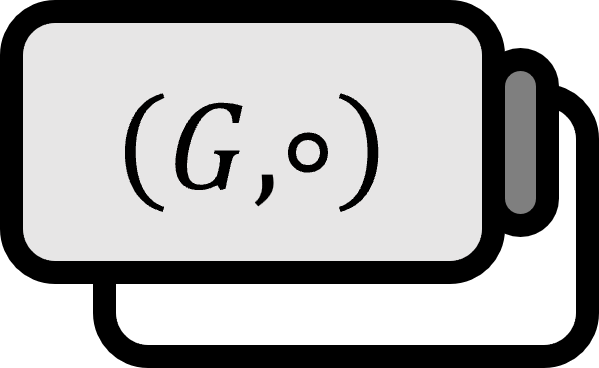Minimum Splitting Field
Definitions 1
Let’s denote it as $F \le E$.
- If $f(x) \in F [ x ]$ is factored into linear terms of $E [ x ]$, then $f(x)$ is said to split in $E$.
- When considering $\left\{ f_{i} (x) \mid i \in I \right\} \subset F [ x ]$, if $E$ contains all zeros of $f_{i} (x)$ and becomes the smallest subfield of $\overline{F}$, then $E$ is called the minimal splitting field of $\left\{ f_{i} (x) \mid i \in I \right\}$ over $F$.
Examples
To understand the concept through examples because the words are difficult,
for the field of rational numbers $\mathbb{Q}$, $( x^4 - 5 x^2 + 6 ) \in \mathbb{Q} [ x ]$ is factored into linear terms in $\mathbb{Q} ( \sqrt{2} , \sqrt{3} ) [ x ]$ as $$ (x + \sqrt{3} )(x + \sqrt{2} )(x - \sqrt{2} )(x - \sqrt{3} ) $$, thus it can be said that $( x^4 - 5 x^2 + 6 )$ splits in $\mathbb{Q} ( \sqrt{2} , \sqrt{3} )$.
Subsequently, the smallest subfield of $\overline{ \mathbb{Q} }$ that includes all zeros of $\left\{ x^2 -2 , x^2 -3 \right\}$ is $\mathbb{Q} ( \sqrt{2} , \sqrt{3} )$, so it is called the minimal splitting field of $\left\{ x^2 -2 , x^2 -3 \right\}$ over $\mathbb{Q}$. The set of polynomials that create the minimal splitting field is not exactly unique, as seen above, $\left\{ x^4 - 5 x^2 + 6 \right\}$ can also induce $\mathbb{Q} ( \sqrt{2} , \sqrt{3} )$.
In definitions, the expression “subset” is used accurately, but for convenience, if it is the minimal splitting field of $\left\{ f(x) \right\}$, it is also referred to as the minimal splitting field of $f(x)$.
Theorems
The minimal splitting field of $f(x) \in F [ x ]$ is isomorphic to all.
Proof
Part 1.
Consider two extension fields $F \le E$ and $F \le e '$ over $F$, and the irreducible $p(x) \in F [ x ]$ over $F$.
Let’s say $\alpha \in E$ and $\beta \in e '$, and define substitution functions $\phi_{\alpha} : F [ x ] \to F(\alpha)$ and $\phi_{\beta} : F [ x ] \to F(\beta)$. Then $$ p( \alpha ) = p( \beta ) = 0 $$, so $\phi_{\alpha}$ and $\phi_{\beta}$ have the same kernel $\left< p(x) \right> \subset F [ x ]$.
Fundamental Theorem of Homomorphism: For rings $R$, $r '$, if there exists a homomorphism $\phi : R \to r '$, then $R / \ker ( \phi ) \simeq \phi (R)$.
By the fundamental theorem of homomorphism, since there exist two isomorphisms $\psi_{\alpha} : F / \left< p(x) \right> \to F ( \alpha )$ and $\psi_{\beta} : F / \left< p(x) \right> \to F (\beta )$, the following is established: $$ F ( \alpha ) \simeq F ( \beta ) $$
Part 2.
Let’s denote the minimal splitting field of $f(x)$ as $E, e '$.
If $\deg f (x) = 1$, then trivially since $E = F = e '$, let’s denote it as $\deg f (x) = n \ne 1$.
- If there are linear term factors dividing $f(x)$, then all minimal splitting fields of $f(x)$ must at least include those linear terms’ zeros.
- If $f(x)$ is represented only as a product of linear terms, all minimal splitting fields of $f(x)$ exactly share the same elements, thus are identical.
- If among the factors of $f(x)$, there is an irreducible $\deg p(x) \ge 2$, $p(x)$, then by Part 1, all minimal splitting fields of $f(x)$ must have elements corresponding to all zeros of $p(x)$, and by mathematical induction, all minimal splitting fields of $f(x)$ must be isomorphic.
■
Fraleigh. (2003). A first course in abstract algebra(7th Edition): p432. ↩︎
